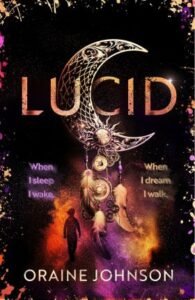Lucid: The Dreamwalker book 1 of 3 by Oraine Johnson (book review).
By any standards, ‘Lucid’ is a solid debut novel. While author Oraine Johnson already has an established career in the arts, what he’s done here is create something in the tradition of authors like John Wyndham who take what we think we know about Britain and then twist it to breaking point. By doing that, they invite us to reflect on just how sturdy all those traditions and institutions really are.
Where Johnson brings the freshness is in going with an urban setting and multi-ethnic cast instead of the usual rural idyll favoured by other writers. Set in his own hometown, Birmingham, but some decades from now, it’s both familiar and different at the same time. Familiar in the way the city looks and feels, but with the United Kingdom apparently having fragmented into smaller regional states following some sort of pandemic, an obvious nod to the COVID pandemic of blessed memory.
The basic gist of the story is that a young Black man, Joe Jacobs, finds himself experiencing dreams where he sees crimes happening. Initially, these feel like some sort of mental health issue, and, to some extent, the novel is a commentary on the lived experiences of how young adults confront things like anxiety and trauma.
In a very real sense, the novel is as much about what goes on inside our minds as out there in the real world. What do dreams mean? Are they entirely nonsensical, as the scientists would have us believe, or do they provide us glimpses into worlds and times outside our waking experiences? It quickly becomes clear to Joe that his dreams absolutely are real, at least in the sense of giving him insight into a coming battle between our world and a world of nightmares. The challenge is to keep his friends and family safe while he tries to find out what’’s going on.
About two-thirds of the way into the novel, we finally get some exposition, courtesy of Professor Grey. Joe and a young woman called Stitch are both Figments, people with psychic abilities of various sorts. Over the centuries, these Figments have protected humanity from nightmarish creatures from outside our world, creatures that in modern parlance might be called ghosts, vampires and other sorts of malevolent spirits.
Running parallel to the supernatural element is a police procedural story involving the horrific murders that Joe glimpsed in his dreams. This is where the detective Kukadia comes into play. He’s a gruff, somewhat broken man working with Joe’s adopted mother, Elizabeth, in the Mercia Police Department. As they go through the process of tracking down what they think is a serial killer, the novel flips from their viewpoint to Joe’s until the two storylines meet up towards the end and Elizabeth finds herself in the firing line.
If I’m totally honest, I found the book a little hard to get into. While the writing is good, it’s probably not aimed at people like me. It feels more like something aimed at young adults, particularly the heavy use of slang. Presumably, some of it is invented but usually decipherable given the context. Johnson’s writing is also very visual, not simply in the bold descriptions of what’s going on, but in the frequent use of emojis, changes in typeface and, even on occasion, changes in the colour of the text on the page.
With all of that said, the story is solid. Inevitably, as ‘Lucid’ is the first book in a trilogy, the narrative ends on a cliffhanger. But enough is resolved to make ‘Lucid’ satisfying on its own. Modern, even postmodern, in style, ‘Lucid’ might not be to everyone’s taste, but if you’re looking to experience a new-future Britain that draws on contemporary issues and culture, there’s a lot here to like.
Neale Monks
October 2025
(pub: Gollancz, 2025. 419 page enlarged pagerback advance copy for hardback. Price: £20.00 (UK). ISBN: 978-1-3996-1015-5).
check out websites: www.orionbooks.co.uk, www.gollancz.com and https://store.gollancz.co.uk/products/lucid


